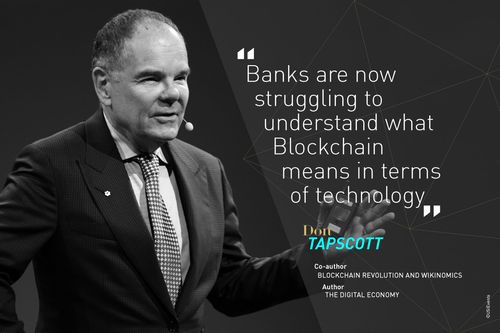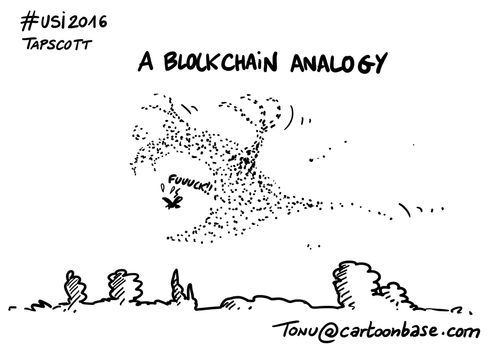Blockchain Revolution: how far can it go?
According to Don Tapscott, the invention of blockchain represents the new technological revolution that is going to transform the business world and the way we tackle organizations and institutions. By implementing a new protocol based on trust, this technology affords new autonomy and disintermediation possibilities.
From the Internet of information to the Internet of value
Mobile technologies, the cloud and Big Data are at the heart of the first generation of the digital revolution that redefined the world as we know it. Yet, one of the most significant technologies of the next decades resides elsewhere. For Don Tapscott, it is cryptographic technology, also called blockchain, which can “radically change institutions and create a fairer world”. In the past 40 years, the Internet has opened up the possibility of copying information and sharing content in the form of texts, music, videos… That is what he calls “the Internet of information”. But the role of copying wasn’t operative up to now, as assets considered as valuable were items such as energy, credit or money. With Satoshi Nakamoto’s invention of the Bitcoin in 2008, the blockchain brings about a fundamental evolution for Don Tapscott: “for the first time in history, we have a media that can capture and share value”.
We are entering the second generation of the digital revolution: “the Internet of value”.
The promise of this disruption
Up to now, the foundations of the economy and society relied on intermediaries such as companies or governments, the centralization of which is the source of inefficiency and injustice. Tapscott gives a concrete example: “today, it is cheaper to send an anvil to China with Fedex than to make an international transfer of money”. Bitcoin, like all underlying technologies of the blockchain, represent a secure media based on a distributed and decentralized model, thus ensuring trust among players. From that point on, anyone is able to carry out transactions without the intermediation of a bank that costs billions of dollars. The applications are infinite: once trust is guaranteed, why not reinvent a new model of democracy?
Imagining new organisations
This blockchain revolution is also sure to bring about strong organizational changes. Many factors can become the drivers of this change alongside technology: the demographic factor with the arrival of 100% native generations; the economic revolution with the decline of traditional companies whose role as transaction cost reducers is no longer justified; social change with the creation of autonomous communities organized around a cause, the Obama campaign being its best example. According to Don Tapscott, new organizations can be imagined around those new driving forces: the blockchain could lead to the end of companies and the creation of communities made up of autonomous agents that enter into contracts thanks to the creation of DAOs (decentralized autonomous organizations) without manager or CEO, where the IT program guarantees the implementation of collective, transparent and secure rules of governance. For a DAO to emerge, the first thing to do is collect funds, which can be envisaged through crowdfunding campaigns: for a few weeks, around 134 million dollars were raised for Slock.it. There is a radical change in paradigm since “as an investor, one would probably want to know what the cost is. But the cost is zero”.
The new winning business models
For Dan Tapscott, the emergence of blockchain disrupts the current economic balance in the digital world, to the extent that “disruptors are about to be disrupted in their turn”. Several business models could therefore emerge:
- Digital Conglomerates: by avoiding companies whose intermediation generates costs and complexity, for instance in financial services;
- Data Frackers: by giving individuals control over their data through the creation of an avatar able to manage their digital identity instead of Facebook;
- The New Aggregators: by creating knowledge sharing platforms managed by users whose identity is guaranteed and secured;
- Peer Pioneers: by replacing “sharing-economy” players such as Uber or Airbnb with networks of autonomous agents who retrieve 100% of the value created;
- Prosumers: by offering consumers the possibility of creating and sharing their own products or advertisement without intermediary brands;
- The Rights Monetizers: by giving designers the ability to manage their design rights without the intermediation of streaming platforms;
- Wiki Workplace: by creating new collaborative work tools, respectful of the identity and private life of individuals;
For Don Tapscott, the new paradigm that is blockchain is far from being a utopia. It essentially depends on our ability to promote its integrity. He compares this integrity to the one found among bird species that fly in a flock to fend off predators: “There is leadership but there is no leader. You earn each other’s trust thanks to an acute sense of collective interest.”
More to read :


